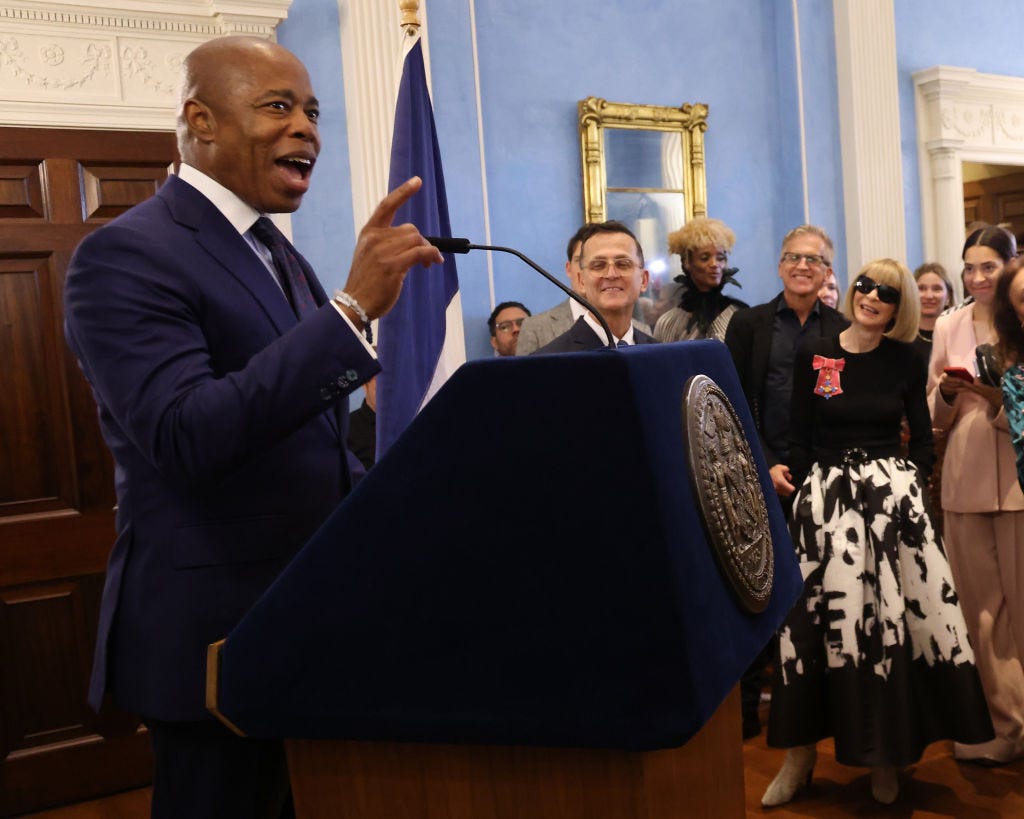It's Not a Crisis If You Don't Care
This is what Eric Adams governance looks like
On Monday, Gothamist ran a good story, one of several in a growing genre, on how America’s largest municipal government is failing to compete for hires and fill vacancies. High attrition rates are slowly damaging the city’s ability to function. The city Law and Health Departments have struggled with shrinking headcounts. A large number of vacancies at the Department of Housing Preservation and Development has hurt the city’s ability to develop and approve affordable housing developments.
The attrition is not natural. Much of it is pandemic related. City workers, burned out from long hours and middling pay, are looking elsewhere. Private sector salaries have been rising. The city has struggled, more than ever, to compete for talent. The unemployment rate is low and fewer workers are seeking the safe harbor of municipal employment.
At the root of the problem, though, is Eric Adams, the new mayor of New York City. Adams has refused to allow municipal workers to follow a hybrid or remote work schedule. Even workers diagnosed with cancer and terrified of Covid can’t work from home. An increasing number of private sector employers, realizing they can still remain profitable and productive no matter where their workers are, have allowed at least for hybrid work. The federal government, for many years, has permitted employees to work remotely. The Friday “telework” day was a staple of my childhood, since my mother, an employee of a federal agency, was allowed to partake. It was better for all of us.
In addition to not allowing remote work, the city is lowballing new hires, likely at the behest of Adams and his inner circle. Starting salaries are lower than they used to be, even though rapid rent increases and general inflation have made the $50,000 salary into something little more than a minimum wage. The city has blamed the low starting salaries on a new collective bargaining agreement, but municipal agencies have always enjoyed some flexibility with hiring, especially for “hard-to-recruit” positions. If a mayor made filling vacancies a priority, it would happen. It’s not much more complicated than that.
The staffing shortages in the city don’t bother Adams because governing is secondary to him. He has no broader policy aims. He is not Bill de Blasio, Michael Bloomberg, or even Rudy Giuliani. He has no greater vision of what New York should look like. He relishes the power of his new perch, but seems unwilling or unable to wield it in any serious manner. So far, he has mostly been interested in rewarding his friends. If an ambitious, well-funded rival showed up in the Democratic primary in 2025, he’d have to fight to stay in charge. He is not very popular.
Adams is more conservative than de Blasio, so shrinking the city headcount could, in theory, serve some ideological aim. But even Giuliani, in his less deranged days, wouldn’t have been interested in leaving vacancies for top positions at HPD or the Law Department. No mayor who wants to get things done tolerates brain drain. Adams claims he is the “get stuff done” mayor when anyone who’s been paying attention knows the opposite is true. His Albany agenda, when compared to de Blasio’s—fighting for a tax hike to fund a new universal pre-K program—is feeble. He has no grand designs for the parks or streetscapes like Bloomberg. Like de Blasio and Bloomberg, he dreams of being president. Unlike them, there is no fathomable agenda to run on. He staked most of his mayoralty on controlling the rate of crime; murders and shootings are down, but he stoked fears for so long that few New Yorkers may believe it’s true. He can’t really control crime anyway. Those wanting affirmative agendas elsewhere, in other parts of government, will be disappointed.
New Yorkers love a good performer, and Adams has given them plenty of that. He still possesses a formidable political coalition—working-class Black voters, organized labor, and the wealthiest donors in the city—and he has time, if he wants it, to regroup and become a different kind of mayor. Will Adams pivot to governing? As year one ticks away, that’s entirely unclear.



Thanks for updating us on this. Adams is even worse than I expected he'd be. Is there a path for a candidate to challenge him? Brad Lander seems very present these days - would he run?
Articles often reference the high job vacancy rate at HPD as the ultimate roadblock towards fighting the affordability crisis. HPD is really only part of the effort.
A much bigger issue is the lack of staffing at the Department of City Planning - who control the City's overall density and map the Mandatory Inclusionary Housing (MIH) program. For instance, the addition of 5,000 private dwelling units to the city would generate at minimum 1,250 affordable dwelling units for incomes at 60% AMI under MIH. Rezoning applications require MIH and no one is there to process them.
City Planning is a skeleton crew. The queens borough office alone only has 3-4 people to process hundreds of new private rezoning applications. The Adams administration is fully aware and just doesn't seem to care. They aren't even allowed to make any new hires until 2023.